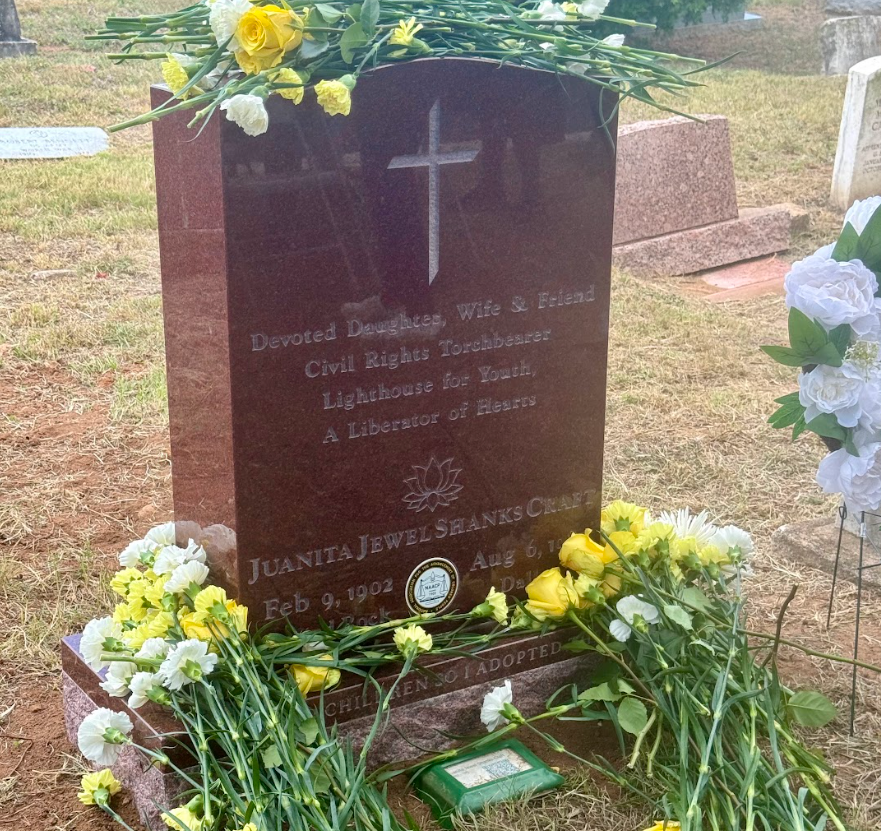Civil Rights icon Juanita Craft honored with long-awaited headstone
Dallas residents rose early on an August Saturday morning to board a 55-seat charter bus for a Freedom Ride from Dallas to Austin. Their destination: The unveiling of Civil Rights activist Juanita Craft’s headstone.
Among the passengers were Craft’s family and friends, some who had stood alongside her in boycotting the State Fair of Texas in the 1950s and ’60s because of their racist policies.

Despite her monumental contributions, it came as a shock to many that Craft’s final resting place at Evergreen Cemetery in Austin was unmarked. Helen Cordes, a local historian and journalist in Williamson County, discovered this when she found a small, damaged QR code on the ground where Craft’s headstone should have been. The plastic casing had deteriorated, rendering the code unreadable.
Cordes reached out to her Dallas contacts, only to find that no one was aware of the missing headstone. This led to the Friends of Juanita Craft Civil Rights House & Museum taking over the project. After six months, with contributions from four sponsors, the Freedom Ride and headstone installation became a reality.
“We were astounded to find Mrs. Craft was without a headstone,” says Candace Thompson, board chair of the Friends of Juanita Craft Civil Rights House & Museum in South Dallas. “We are making this oversight right by restoring dignity and respect to Mrs. Craft’s name and life.”
So on Aug. 3, at Oakwood Cemetery Chapel, around 100 men and women gathered shoulder to shoulder, filling every available space. Emotional speeches highlighted the profound influence Craft had on personal lives, while inspiring poems celebrated her relentless pursuit of justice.
Craft’s journey to becoming a civil rights icon began in Austin, where she attended school after being born in Round Rock. After moving to Dallas, she became a force for social justice, notably becoming the first Black woman to vote in Dallas County and helping establish 182 NAACP chapters across multiple states.
Craft also made history as the first Black woman in Texas to register people to vote. She’s well known for boycotting and picketing the State Fair of Texas, which until 1967 allowed Black families to attend on only one designated day.
“It’s so important for the media to share that there is a marker there, so people can visit Craft’s home here in Dallas and in Austin to see where Mrs. Craft’s remains are,” says Linda Lydia, the current membership chair for the Tri-Cities Branch and Texas State NAACP secretary.
Cordes gathered with those who had traveled, saying “it meant the world to me to be there that day to celebrate. To see that my actions also helped set in motion the much-needed process of getting her a beautiful new headstone makes me feel extra happy.”
Share This Story, Choose Your Platform!
Brenda Hernandez-Rodriguez is Dallas Free Press’ 2024-25 Report for America corps member. A bilingual journalist who is passionate about the field, Hernandez says, “I know it has the power to change lives, even sometimes to save lives. Brenda graduated from St. Edward’s University with five internship experiences that prepared her to be a reporter who makes a difference.
When Hernandez is not writing, she enjoys spending time with her dogs, whether watching movies together or walking. Hernandez also proudly calls herself an adventurous foodie and has become a go-to source of advice about where to eat next in her hometown of Austin, Texas.
Areas of Expertise:
Community journalism
Civic reporting
Location Expertise:
Dallas, TX
Official Title:
Report for America Corps Member
Phone Number:
+1 (512) 739-8153
Email Address:
brenda@dallasfreepress.com







